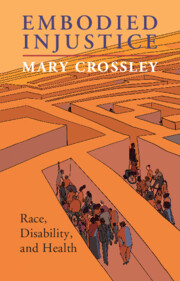Book contents
- Embodied Injustice
- Embodied Injustice
- Copyright page
- Dedication
- Contents
- Acknowledgments
- 1 Introduction
- 2 Health Disparities Based on Race and Disability
- 3 Biology’s (In)significance
- 4 Medical Mistrust
- 5 Maligned Mothers
- 6 Medicaid Preservation
- 7 Beyond Health Care
- 8 COVID Stories
- 9 The Busy, Troubled Intersection of Blackness and Disability
- 10 Conclusion
- Index
10 - Conclusion
The Payoff for Health Justice
Published online by Cambridge University Press: 18 August 2022
- Embodied Injustice
- Embodied Injustice
- Copyright page
- Dedication
- Contents
- Acknowledgments
- 1 Introduction
- 2 Health Disparities Based on Race and Disability
- 3 Biology’s (In)significance
- 4 Medical Mistrust
- 5 Maligned Mothers
- 6 Medicaid Preservation
- 7 Beyond Health Care
- 8 COVID Stories
- 9 The Busy, Troubled Intersection of Blackness and Disability
- 10 Conclusion
- Index
Summary
Few people, if they paused to reflect on the question, would disagree with the idea that various aspects of a person’s identity have a bearing on their experiences in the world. There are differences in how a person of twenty-five years versus one of sixty-five years mediates a dispute, trains to run a marathon, or walks into a dance club. Completing a graduate degree versus dropping out of high school affects the opportunities a person has when applying for a job or running for office. Identifying as a woman, a man, or neither will affect a person’s experience of serving in the military, seeking a job promotion, or being the primary caregiver for young children (at least in many locales). Most of these variations in experience have little to do with persons’ biological differences. Instead, they grow out of social environments and others’ expectations. To the identifiers of age, education, and gender suggested above, we can add race, disability, immigrant status, sexual orientation, and other markers of identity. And it is the intersection of those multiple various aspects of a person’s identity, combined with personal choices and life experiences, that make each person distinctive and shape each person’s experience.
Keywords
- Type
- Chapter
- Information
- Embodied InjusticeRace, Disability, and Health, pp. 221 - 240Publisher: Cambridge University PressPrint publication year: 2022



